Blaire Martin
March 29, 2019
What’s one central theme I learned about Blaire during the course of our conversation? She’s not afraid. Blaire is fearless when it comes to making the ask, stepping outside of her comfort zone and putting in the hard work. Her grit is infectious and I hope she rubs off on you as well.
What’s it like to be a young female CEO who is immersed in a male-dominated industry? Well, I found the person that can answer that question! Her name is Blaire Martin, and she’s probably working on a deal as you’re reading this.
So here’s the scoop …
As the VP of Strategic Partnerships at Florida Funders, the co-founder of the Florida Angel Nexus, and as a co-founder of the FAN Fund, Blaire has aided investors to deploy capital into early-stage Florida businesses and prepared entrepreneurs to raise capital since 2012.
She knows lots of people who have money and knows lots of people with good ideas. More on that later … and an awkward elevator experience …
More recently, she is now focused on supporting founders to capitalize their upcoming critical milestones as the Director of Finance at Everix Optical Filters in East Orlando and consulting through her company, Activate Florida.
Honestly, as a self-funded bootstrapper, I don’t know much about this world other than the top layer of jargon. I’ve wanted to meet Blaire, and also learn about angel investing, so this was a great opportunity to double up!
[Setting: The weather was perfect so we met at Lake Eola. This is the second time I’ve come back to have an interview in this beautiful setting. ]
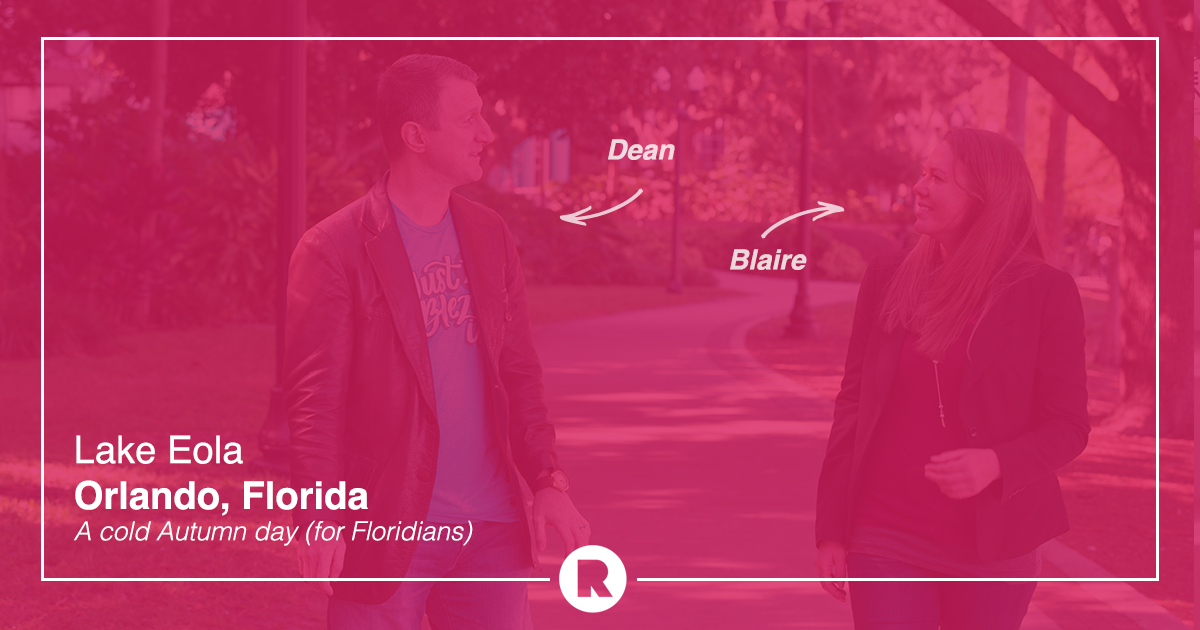
Dean: How did you get people to take you seriously as a young CEO?
Blair: I think the challenge is getting in the door. So, the first thing is that I found people who were 20, 30 years ahead of me in their careers and I asked to shadow them, asked to go with them to events, and started building my network throughout Central Florida, getting invited kind of as a plus one, as someone that was eager and willing to learn. Then, I was able to start building relationships with people one-on-one and kind of building my own credibility through that. I don’t really ask permission to go to events either, even things in Tallahassee like the Innovation Caucus and the Florida Research Consortium. I just always asked when the next event was and kind of asked if it was a problem if I attended. So it wasn’t, ‘Oh am I invited?’ When I was younger, I didn’t know if everyone wanted my opinion yet so I used a lot of research. Instead of just sharing my opinions, I typically would bring a lot of research that backed up how I formed my opinion and I didn’t even use the word ‘I’ or express it from my point of view. I spoke in well, you know, how they did this in Ohio or how they did this in Wisconsin, and I used those third-party examples to get my point across until my point of view mattered at all. And I think I just went for it.
I don’t think I ever was shy to ask for coffee with someone
Dean: How old were you when you started doing that?
Blair: Well, I started working at UCF in 2010 and really how I started working there was asking Mike O’Donnell if I could shadow him and then I met Tom O’Neal at an event. So Mike and Tom were both great mentors, and then Randy Berridge and Ed Schons as well. I think they saw how eager and excited I was to learn and meet new people and then they helped invite me and bring me into those rooms. So, I probably was 22 when I really started to dig into the Tech Community specifically, but I don’t think I ever was shy to ask for coffee with someone. I always went to office hours of all my professors. People who had things going on off-campus that I thought was interesting. I’d always ask them to attend and participate, so I got to know people as people. A lot of students just go to class and check out afterward. I think as soon as I was a freshman and on campus, I started taking advantage of everything that UCF had to offer. I mean, there’s a lot of benefits to being at such a large school. There’s just so much and there are so many people on campus that you can access as a student, and ask crazy questions, and make weird requests of, and I think I just took the initiative to do that.
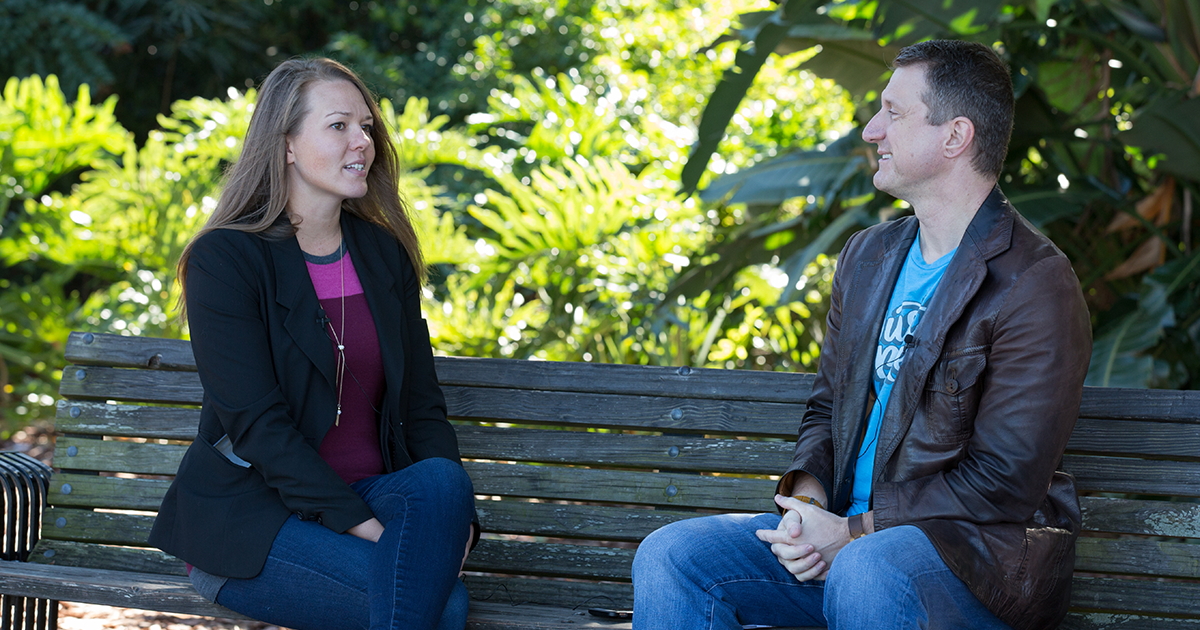
Dean: I know that when I go there now and I look at the resources and opportunities they are just like night and day from when I was there [at UCF]. Do you have any networking hacks that you could share with us? Perhaps for people that might even be a little bit more introverted than you?
Blair: The main question I ask people is: what are you working on that’s exciting? That kind of takes away the ‘who are you employed by’ because sometimes what they’re most excited about isn’t really their job and it also gives them the opportunity to present something that maybe you wouldn’t expect from that person. So, they might be a high-level city official and you’d expect them to go straight into kind of their talking points, but they might bring up something else that is something you could connect with on a different level. Find something you are really comfortable talking about and find a way to kind of bring the conversation to that. A lot of times I would mention to people when I was still in school and maybe not as well versed in my actual career yet, I would bring up that I was the captain of the UCF water polo team and I love talking about water pool, so for me, I get excited when I talk about that, people can see my energy level. A lot of people are curious about that so it’s something that people remember me for and I can kind of drop in that I was twice All-American in college and then people know how competitive I am and how driven I am and so, I think to find something that you’re really excited to talk about and find a way to get other people to be inquisitive about that. Be memorable. Just be yourself. Even if you’re awkward, just say ‘Hey, sorry, I’m not very good at networking.’ Just kind of break the ice with that and then people kind of lower, I don’t want to say lower their standards, but they’ll give you kind of a break like don’t worry about it, you don’t have to be nervous talking to me, you know, I get dressed every morning just like everyone else, and that can kind of take the pressure off of something that I think is a little less comfortable.
Nexus got acquired this year …
Dean: I think the magic in that question you said initially is that it’s so open-ended.
Blair: Maybe it’s their kids. Maybe their son is going to States in wrestling or something really random like that and then you can connect on something genuine and not just what they’re used to talking about or whatever they’re promoting at that moment. So yeah, I think just genuinely connect with people. If you’re down to earth and, I don’t know, willing to just kind of chat about anything and just fully be yourself, I think people will remember you, want you around, invite you in that room next time…
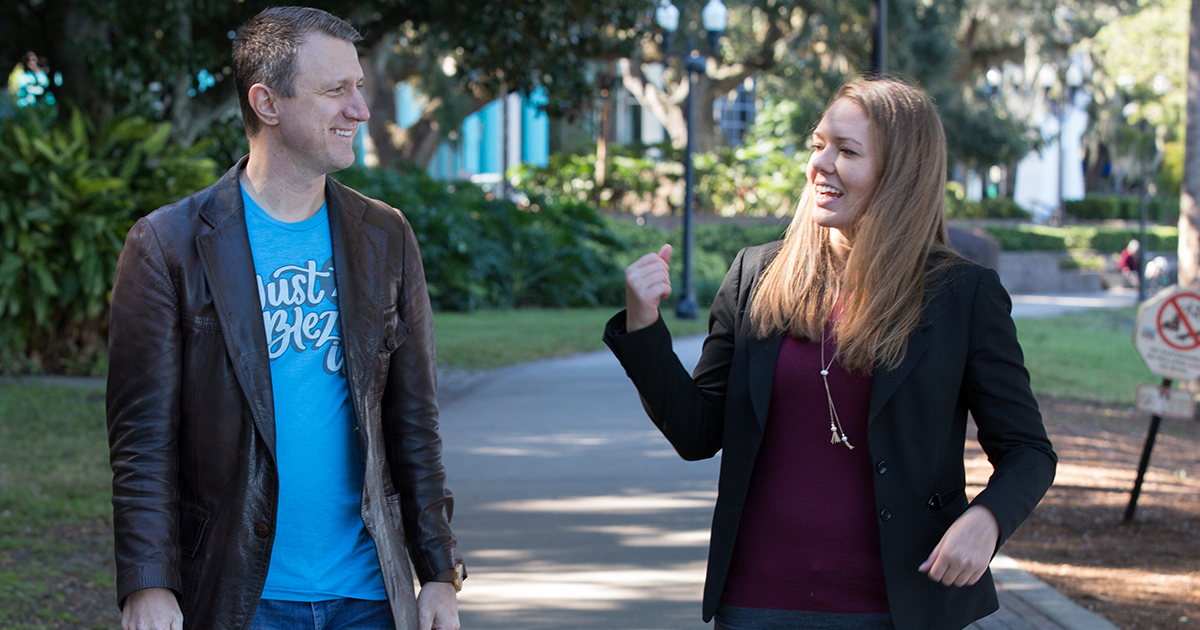
Dean: I think that’s good advice, too, because sometimes people, especially after hours, they’re just worn down. They don’t want to rehash what their job is, etc. It kind of breaks the ice to maybe shift the conversation and not be so, you know, talking shop again.
Blaire: I have cocktails with people. I like to have a couple drinks a couple of days a week, so I don’t know, just meet people where they want to be. I usually offer do you want to have coffee, do you want to grab a cocktail? If they pick cocktail, I’m like okay, this person wants to just kind of get to know each other, hang out, and we won’t even talk about work sometimes the whole first time we hang out. Then, you have this new friend who you can call upon if you really need them for something, you can learn kind of where they’re coming from and better tailor your request down the road that would fit what they’re into.
I do real-life Shark Tank
Dean: So this question is kind of connected to the last one, but I noticed on LinkedIn, your headline says ‘Connector.” Tell me about that. How did you come to that as opposed to all the other things you could have written?
Blaire: Yeah. Well, Nexus got acquired this year by Florida Funders and so I actually have multiple projects right now. So, where before, I would have said co-founder and CEO of Nexus, really my role right now is to connect the dots on a lot of different things. So, I’m connecting Nexus in with the Florida Funders framework, one of my main jobs is kind of managing that transition. I’m working with Synapse Florida and connecting the whole state to this initiative that’s headquartered in Tampa, but the goal is to be statewide, so my role of VP of State Outreach there is really just to be a connector. I think I find the most pleasure out of coaching and connecting people so, like I was coaching student companies at USF on Wednesday and even the companies that didn’t make it to the finals, I wanted to at least make one meaningful connection for each of those students that would help them either learn why this is a great idea or learn why this isn’t a great idea, but help them get off campus and get some feedback from someone with a lot more experience in whatever they are doing. I would say, you know for younger people, getting out of your comfort zone and surrounding yourself with people that are much further along is really key. That would probably be one of my biggest pieces of advice for students is just get off campus. If your peer circle is just people your age, then it’s hard to learn from that, and especially if you’re really driven, you’re probably one of the leaders within that peer group, so go find people who are leaders within their peer group and much further along. So yeah, I like connecting people to other folks that could help them move forward, especially if you’re doing something really big, you can’t just deal with your own inner circle, you really have to jump for that next tier. I think one of my skill sets is just building relationships really quickly with a lot of people, so typically I have someone in my Rolodex that can help someone with what they’re doing, and if I can make that connection, then down the road if I have a request, they’re more likely to want to help me with whatever big goal I have at that moment.
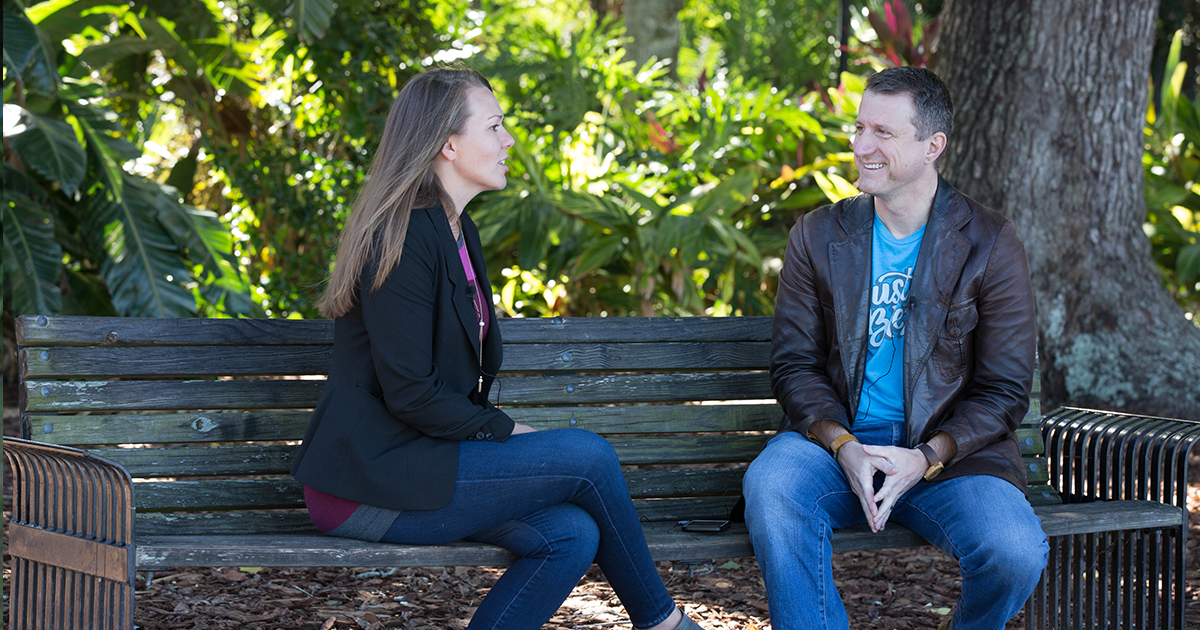
Dean: So the connector of people and dots.
Blaire: Yeah and with people from other programs. Sometimes you get so focused on what you’re doing that you can’t really see what else is going on around you, so I think, you know, either to people that have been there and done that before and can at least shed some light on what didn’t work, what did work, or just other programs that you should be aware of kind of the macro environment so you’re not building something in a vacuum.
… I wouldn’t put them in a gauntlet.
Dean: And that is the currency of connection. It’s crazy because that connection you made costs you nothing. It costs you nothing and we all have it in our pockets, but you’re choosing to use it whereas many other people are just sitting there with blinders on and they’re missing those connections and those dots out there they can easily use.
Blaire: I think some people live their life kind of positional, so they feel like their Rolodex is an asset of theirs and the more they share it, it somehow that diminishes their asset. I just don’t have that point of view at all. I think your asset is your skill set, your relationships. Just because I give a connection to someone else doesn’t diminish my relationship with that person, unless the person is annoying, which I wouldn’t put them in a gauntlet.
Dean: I would argue that makes them more valuable because once you do that, you teach others in your network how to do it.
Blaire: I’m all about empowering people to be the best they could be. I was a captain at the UCF water polo team for a long time and I think helping people play their best, helping people perform their best, helping people get better connected to people that will challenge them and help elevate them to the next level, that’s the least I could do. And I think in exchange, a lot of people are willing to help me out when I need something, so I can send a mail merge out to a hundred people and they’ll actually all get back to me because they know I wouldn’t ask for something if I didn’t need it and that they probably want a favor from me down the road, too. I don’t think of favors as a currency or anything, but I think the more you pay it forward, the more likely people are to be there when you’re trying to do something extremely ambitious and you need a team effort. I know that you and I have spoken about Tribes and Seth Godin before, but building that community around you is is really key if you’re doing extremely ambitious things.
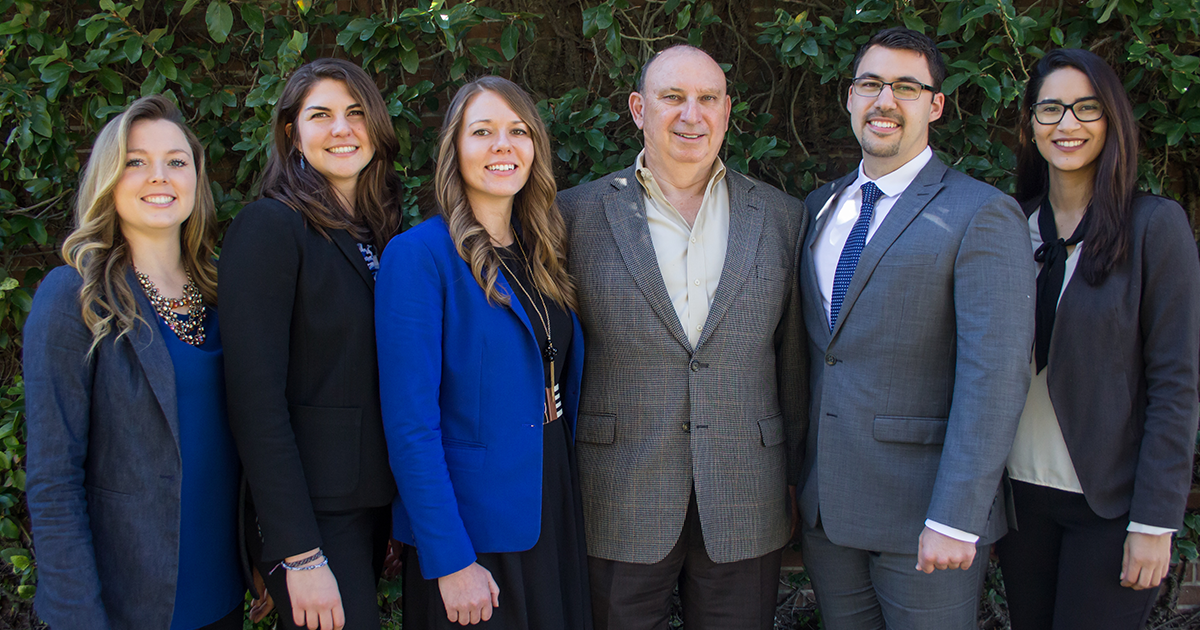
Dean: Switching gears here, talking more on the investment side with companies, is there something that’s maybe not obvious that you think makes a company very investable? And I say not obvious because of like, you know, demonstrated sales and obviously crazy trajectory, and perhaps it’s an emerging market, etc. But is there something not obvious that maybe you personally look for that makes them very investable?
… if money gets tight, you’re not going to just bail.
Blaire: I mean, an investment is a long-term relationship and due diligence is kind of like dating, so they’re evaluating do I want this person, this CEO, this team in my life for the next three to five years. So I do think there are some intangibles there as far as being coachable, showing evidence that you can work with your board of directors, work with your advisors, work with your investors … the ability to delegate. I think it’s one thing when you’re raising money as a small company of three to four employees. How well are you really working with those employees? Are you a bottleneck on everything? Because if you have to go to 20 employees, 30 employees, are you going to be able to scale yourself and empower other people to take big responsibilities within your company? Are you really a solopreneur or a lifestyle entrepreneur that can be self-employed or you really someone that’s the leader that can grow a large company? So, a lot of it does come down to the team and I think some people can get transactional when they’re raising money and get to know someone and be like, hey, this is the deal, are you in or are you out? Unfortunately, especially in the early stages, this is a long deal. You’re in it for a while with these people and they want to know that this isn’t a transaction to you. That this company, if it gets tough, if money gets tight, you’re not going to just bail. You’re in this, so I think how much skin you have in the game financially, how invested you are into the project, into the relationships you’re building with these investors … A lot of it goes back to that relationship. How do you feel when you think about that company? A lot of times the spokesperson and the face of the company person, the person that’s really going to drive success and has the most equity in it is really key to that.
Dean: So kind of an off-the-wall question, do you think Shark Tank is good for America? Most people have seen Shark Tank because it has been around for a long time now and it kind of frames what entrepreneurship is for a lot of people. What are your thoughts on that?
Blaire: I’m a fan of Shark Tank. I don’t watch television, first of all, so I almost never watch it, but it did make Angel Investing mainstream. People now know what Angel Investing is so if someone asks me what I do, I’ll say I do venture capital. I do real-life Shark Tank. I put real investors in a room with real investment opportunities with the goal of helping those investors build a portfolio of Florida companies.
… all the over 70 companies we’ve funded …
Dean: Do they start pitching you then when you say that?
Blare: Yes. [Dean and Blaire laugh]. I mean, I’ll get in an elevator and someone that was just walking by will see me and will jump in the elevator and I’m like do you even need to use the elevator or am I about to be actually elevator pitched? It does happen often. I work out of Industrious and you’re walking around downtown and I joke that I have like a floating dollar sign over my head because I think people know that I know rich people and they want money for their ideas. As far as it being good for America … so it helped me because I didn’t have to explain what Angel Investing was. It is mostly consumer products, which in the scheme of things, venture capital very rarely goes to consumer products. It has to be someone that’s a strategic investor that really likes those type of deals. So, we don’t do consumer products. I mean, in all the over 70 companies we’ve funded, I don’t think we’ve done any consumer products. So all of the little widgets and food companies and things, it’s relatable for the person watching it. We do mostly business-to-business software applications where the person buying it is VP-level or C-level person within a company. It might be super obscure like, you know, advanced material manufacturing for optical filters. It’s not simple little doohickeys.
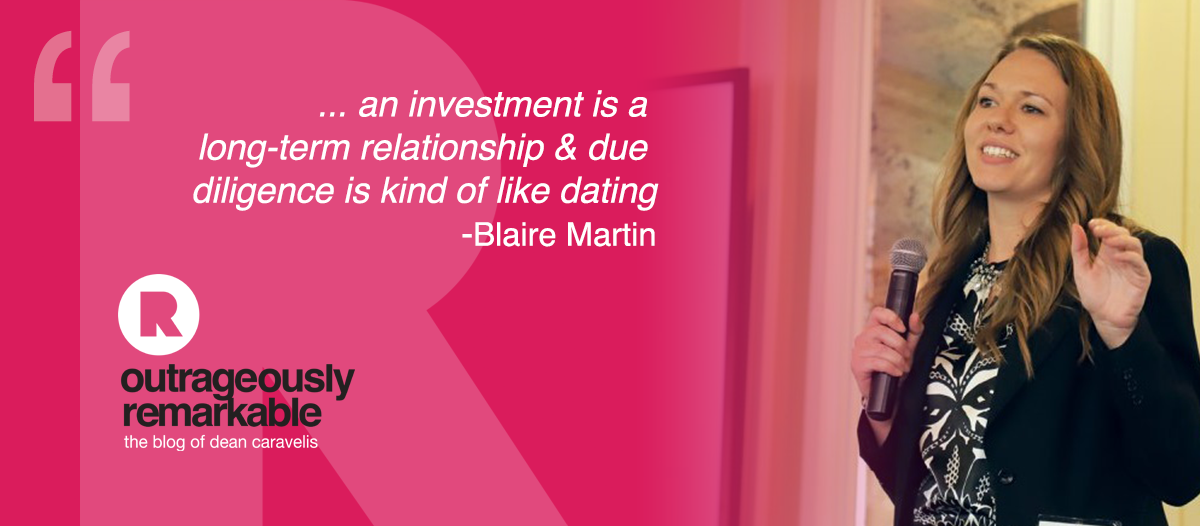
Dean: It’s not the new corn dog.
Blaire: [laughing] No. So, I do think there has been a shift where entrepreneurship is less about revenue and more about the ability to raise money. And, you know, even with the accelerator programs around the state and the country, I’m always emphasizing to the people running those cohorts to focus on revenue because revenue investment dollars will follow revenue. If you’re building a company to raise money, investment dollars will not necessarily follow that, so if the goal of the accelerator is to put together the perfect pitch for demo day to raise money, those companies probably will not be that successful raising money. So, I do think some entrepreneurs feel the goal is raising money and do not spend enough time building the relationship with the customer, which is really understanding what the customers want and getting paid pilots or getting some initial sales under their belt. I mean all of this culminates in this demo day and they want as many investors in the room, so I think there are multiple things happening at once. I don’t know if it’s all a Shark Tank effect, but they film hours of content for 15-minute segments, so it’s not real life. It’s not real life at all. There have been multiple companies here in Orlando that have been on Shark Tank and when they might all say that they’re going to do the deal and then behind the scenes the deal is really all wonky. And so a lot of those deals that they say they’re going to do don’t actually happen, but the companies that have been on it usually, if they do get offers, they end up when the episode views getting offers from investors. So I do think if I was a company that got accepted on Shark Tank I would do it. I don’t think it could hurt, especially if you have a consumer product, but the more you focus on revenue, the more real investors are going to want to get involved.
You won’t have to jam it down investors throats …
Dean: Which is the same thing a bootstrapper has to do really. They have to focus on revenue.
Blaire: I recommend bootstrapping as long as possible. Capital is expensive. So, if you can keep your full-time job and start building a company on the side, find a technical co-founder if you’re more of an entrepreneur/business type. You need a team that can bootstrap for a while until you can really demonstrate that your model works and your minimum viable product, there’s customers that are willing to use it even if it’s kind of buggy and not ideal, and really hone in on what that true value proposition is for that customer segment. So, when you get entrepreneurs that come in saying ‘oh anyone would want my product,’ you know, kind of that mass appeal, that’s not interesting because it’s too expensive as an entrepreneur with a limited budget. You really have to hone in on who wants your product the most, and who’s willing to pay the most, and who has the shorter sales cycle, so that you can get that traction and momentum. I always remind companies that the cheapest form of capital is retained earnings. So if you can just reinvest in your own company with the cash you’re bringing in and build a product that you can bring a nice margin in on and one that customers are really demanding and want very badly, then everything becomes a lot easier and investment will follow that circumstance. It will be much easier to raise that round. You won’t have to jam it down investors throats and then be upset that there’s no capital in Florida, which there’s lots of capital in Florida for companies that are well positioned.
Dean: Is there a common red flag that you look for in founders or one that seems to pop up very often that you pay attention to?
Blaire: What I’ve really learned is to look for how much skin they have in the game. I mentioned it earlier. It’s going to be tough …
Dean: When you say skin in the game, are you saying I guess time and money?
Blaire: By the time you’re raising a significant round, you need to have a full-time team, so at least two people that are full-time on it. It can be quantified in different ways. I mean, if you’re young and broke and you don’t have a lot of money to put in, but you put everything you possibly can and you’re walking to work and doing everything you can to invest every dollar available into the company, then that shows something. So it doesn’t have to be the biggest dollar amount. I guess it’s relative to where you’re at in your life and things like that, but people that have had an exit and don’t have that much money in the deal and are raising outside money … It’s easy to bail. I think investors look for, you know, is this person going to stick to it when times get tough? And, you know, we’ve seen some founders that have left the company for better opportunities and it’s tough to bring in an interim CEO or another CEO that has the same passion as a co-founder, especially if that first CEO sells a lot of shares, you know, how does that work? Because then you have to incentivize that new person to be as passionate or you’re going to have this ongoing problem of is there enough upside to make all the sacrifices that are required to really build a venture back business? It’s very glamorous, maybe this is something that Shark Tank has kind of publicized, how glamorous it is being an entrepreneur …
You can commercialize crazy materials …
Dean: They only show the wins, too. Only flashbacks of like, here are all these great wins. They don’t talk about the other ones.
Blaire: Yeah and how many sleepless nights and how many missed birthdays and missed, you know, travel events they could have done. You don’t necessarily get to take, you know, two weeks for a trip in Europe and there’s a lot of things that for that three-to-five year sprint where it’s really tough and you don’t have a lot of cash in the bank, it’s a 12-hour a day, you know, six to seven day a week job. People think being self-employed is wonderful, and you know in a lot of ways it is, but you have to be willing to make the sacrifices to get your business over that hump and kind of through the growth trap, too. I’d say the other thing is just not being humble to what you don’t know. So, people who come in extremely confident and we might challenge them a little bit, maybe it’s valuation, maybe find some comparables, find a comparable, and they’re like those don’t really compare because of this or that. Well, it’s like, find anything that justifies kind of either the valuation or your stance on this one point that you just seem like you won’t budge on and sometimes the founder is right, but I think there definitely can be a personality challenge. A lot of entrepreneurs are entrepreneurs because they are very self-confident, but I think being willing to not be so rigid and to constantly learn. I mean, I love people who, let’s say they come from a technical background, but they read four sales books, and one of our investors recommends another one, and by the time next time they see that investor, they’ve read that book. You know, that type of stuff where you’re a sponge, you want to keep getting better, you’re not already the best, you’re constantly finding things that you could improve on and continue to move forward on and honing your own skill set. And you know, if you’re going to raise money, read some books on raising money so that you know all the terminology and you really understand the investor mindset. So I think having that kind of lifetime learner perception is really important because you are going to get into hard times, you’re going to get into situations where you don’t know the answer, and if you’re just going to wing it, that’s going to scare investors. They want you to bring in outside expertise, get a bunch of opinions, read thought leaders on that topic from around the world.
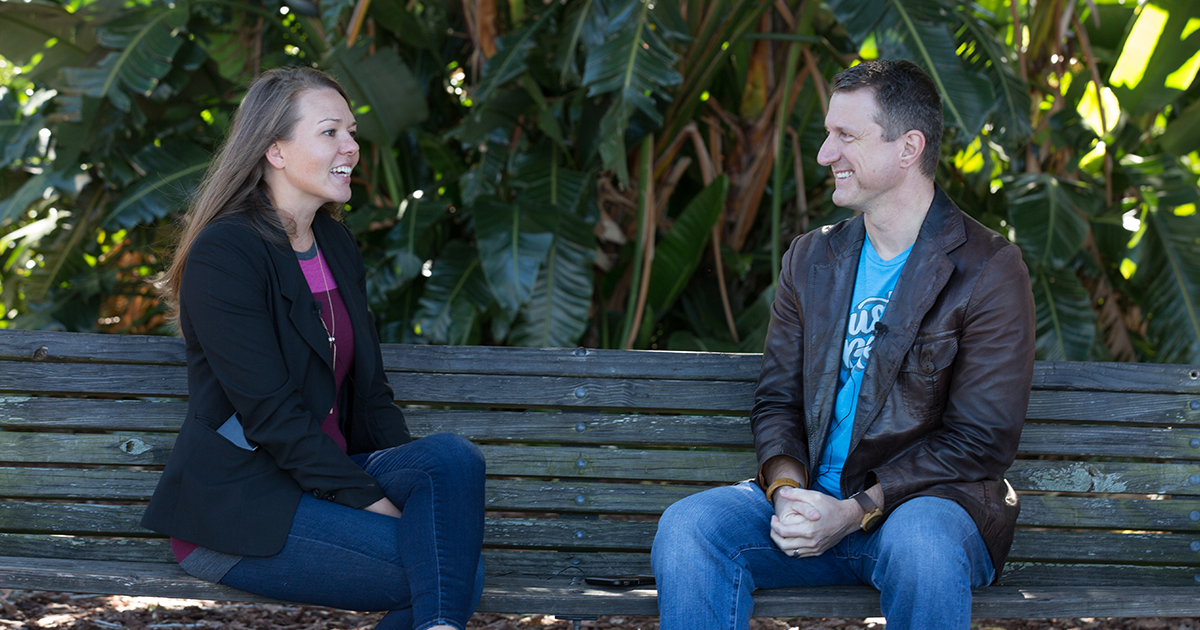
Dean: Blaire, if you were going to start a company from scratch right now that was in an industry and a type of company that’s not something you’ve been involved with personally or worked for in the past, what would that be? What would be your thing? You can be as specific or as general as you want.
Blaire: So, I think what I really went to school to do and have always been really passionate about is working with highly technical people who maybe don’t have the relationship and finance skills that I have. So, my value proposition to a company is that kind of business development, strategy, team leadership.
Dean: That sounds like a company right there
Blaire: In finance. Yeah, so I actually have my own LLC now and I’m a connector, I do all of those things. So I have three projects with my company now, so I guess I am somewhat doing that already.
Dean: Is there’s an industry you’re most passionate about? It sounds like it’s technology.
Blaire: I like very high tech companies that have high margins and have a very disruptive approach to something. So, I just started working with a company I alluded to a little bit earlier, it’s a highly advanced manufacturing advanced material and they seriously turn very inexpensive plastic using their advanced manufacturing process into optical filters that sell for hundreds of dollars. And so you have a very inexpensive raw material that when transformed becomes a very expensive finished product and they do it in a way that’s very disruptive. No one is making optical filters in this way, so there’s a lot of applications that are better suited for this way of making optical filters and there’s actually people, you know, in life sciences and augmented reality and in a lot of different verticals that are desperate for a solution that is better suited for their need and their challenges. So, I look for companies, myself, that have a team of either PhDs or just highly technical people that need my kind of expertise to come in and manage customer relationships, manage the finances, raised a bunch of money so they can hit their next milestones. I may found a company from scratch myself one day that’s, you know, high-growth startup, but I started working at Tech Transfer in 2010 at UCF to really to learn how to work with PhDs and commercializing intellectual property. So another thing I would point out is there’s amazing IP (intellectual property) on the shelves in this state if you go find it. UCF is a great place and NASA Tech Transfer is an hour from here. You can commercialize crazy materials and I mean, they have so much there. And you can commercialize intellectual property that is just sitting in a folder and doesn’t, you know, isn’t hitting the commercial landscape. And then there are research institutes, as well. We have Mayo and Moffitt in the state. So, as someone that doesn’t have a Ph.D., probably is not going to invent something or file patents myself, maybe one day, but that hasn’t been my plan right now, learning to commercialize intellectual property and work with a highly technical people I think will present opportunities. Then you have that barrier to entry, as well. So if you can really lock down a lot of patents around advanced manufacturing process or something then, you know, if 3M or some large company wants to work with you, they have to license or acquire you, and that’s where the big multiples come in on exit. So, there’s a lot of neat apps and things out there, but you can have the best marketing in the world, if you don’t get enough market share before a bigger player comes in, then it can be really challenging to drive that multiple and that exit valuation.
Dean: My final question is one that requires you to step outside yourself and just think of yourself objectively, you’ve probably already answered this throughout the last half-hour, but what is your secret to being outrageously remarkable?
Blaire: I would say just being myself. I think just being genuine with people, always being extremely honest, even if it’s a tough conversation to have. Being someone that people go to for a candid conversation and just always being willing to pay it forward. So, you know, I wouldn’t recommend projecting what you think a business person is or projecting how you think venture capitalists or finance professionals act. Just be the best form of yourself every day and people will naturally be drawn to you and build confidence in what you’re capable of and know what you’re good at. Find people that compliment that and bring them into your inner circle so that you can you know take on bigger challenges together.
____________
Connect with Blaire on LinkedIn and say, “hi!”
A big thanks to Brad Baskin for the last minute photo shoot! Much appreciated.
Want to keep up with Dean’s blog? Subscribe here for fresh perspectives monthly